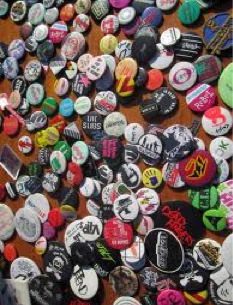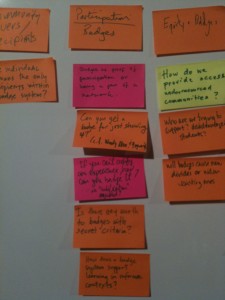Badge Lab @Mozilla Drumbeat

What does a radically flattened, net-enabled paradigm for accrediting learning look like?
As I hinted in my interview for Mozilla’s Drumbeat Festival last week in Barcelona (which was enjoyably activist/plot the revolution in vibe 🙂 — one of the really tough nuts to crack around open peer learning is accreditation, hence my interest in Badge Lab, where I spent quite a lot of time. (Hal Plotkin brought us greetings from President Obama, and encouragement to disrupt the accreditation status quo!)
We need to smooth the accreditation curve for informal, self-directed learning, possibly based on a lot of free internet/open educational resources and social interaction with peers. Like many educational institutions, Open U is now experimenting with the accreditation of students’ prior learning and experience in a variety of ways. But Badge Lab was pushing the model to the extreme, asking the question at the top.
We came up with myriad use cases, categories of badge, worried about whether we were in danger of reinventing the lumbering institutions we’re trying to move away from, as well as recognising, but not dwelling on, the challenge.
With due acknowledgement to the many participants who helped me clarify my own thoughts, the preliminary conclusions that I drew go something like this:
- A Badge infrastructure should be agnostic about who is awarding, and what the criteria are. Simple is best. Don’t over-engineer it. Follow the principles of net-neutrality that’s made the internet so successful. How the badge came to be awarded should sit outside the system: all the badge infrastructure needs to know is that it was awarded, with some basic, uncontroversial metadata that will allow others to build cool apps on top to browse, search, visualize, etc.
- A Badge infrastructure is like Verisign: it gives confidence that the claimed badge really was awarded via an authenticated, trustable infrastructure.
- A set of Badges is shorthand: something to scan quickly, a conversation opener to find out the Story Behind The Badge, just as you do when you see something on a CV, or a LinkedIn endorsement.
- Many Badges will be Low Stakes: they’re not worth gaming the system to obtain, because their authority derives entirely from the awarder’s reputation. Since much of the time the awarder will be unknown to a third party, a key attribute of a Badge is the link the owner provides to the story/evidence.
- There seems to be particular interest in Badges for authentic, practical learning. The point is that we already have existing systems in place for communicating and examining academic, abstract bodies of knowledge, but what’s missing is a way to document in one’s portfolio the authentic applications of one’s knowledge and skills, at an appropriate granularity. Moreover, since such displays of knowledge are by definition situated in unique contexts, the most authoritative sources of evidence will be real people who had direct contact with you.
- We could equate Badges with clearly codified, formally assessed qualifications: a university might indeed provide a badge that confers a degree, but here we’re simply providing a digital replica of the current system. Instead, let’s think about how we appropriate symbols to project our identity. Badges could — most likely will — be used for personal expression, like your clothes, homepage, blogroll, tweets, what’s on your bookshelf or music playlist. It follows that we should think about enabling Badges to be awardable by individuals, including yourSELF should you see a way to characterise your learning from a set of authentic experiences that only you have had. I’m imagining not only community groups inventing badges to recognise talent and motivate their team, but groups of teenagers awarding each other badges, creating a local currency.
I don’t know to what extent this overlaps with what others concluded, or what’s being coded into the demo platform that was being developed while we discussed, but the sessions were enjoyable and much food for thought. Interested to track how this develops. They’re pushing forward on the coding as I write…

Related is the idea of education being like going through levels in a game, with some of such “level badges” being awarded by the project teams engaged in the activities being “stamped” or “sealed” by those badges. Something like Oath could provide the authentication infrastructure, so that you know the badge was being displayed/confirmed by a trustworthy authority (trust always being modulo yourself). Whether you consider that authority’s awarding a badge to someone meaningful or worth anything is of course another matter.
This would allow going beyond learning objects to learning processes which are part of a marketplace or soup providing learning experiences and validating results of journeys through those.
Hi Mark,
Yes, gaming is one of the inspirational paradigms behind Badges.
S
The teenagers on the Schome project /www.schome.ac.uk/wiki/ initiated their own programme of barnstars (based on the Wikipedia model) – which grew to include 33 awards and inspired three weeks of forum discussion. They outline the barnstars on this wiki page, which was put together by six teenagers – none of whom had met other than in an online environment http://www.schome.ac.uk/wiki/Schome_Wiki_and_Forum_Barnstars
Their introduction reads: ‘If you think someone has achieved something special, or they have met the criteria for an award, then copy the code of the required “barnstar” and insert it on that person’s talk page. It is important that it is on the talk page and not the userpage as not everyone likes userpages being edited. It is up to that user to move it to their main page.
When awarding a barnstar, remember to give a little piece of text explaining why you’ve given the award. Be bold! The following are some of the barnstars and awards currently in use. The same Barnstar can be awarded more than once, by the same person, for instance if someone did something for you more than once you can give them the acknowledgement Barnstar twice. If you don’t think any of these cover the topics you are looking for, you can always design your own award (using these examples, if you like). ‘
Update: this has now evolved into Mozilla Badges: https://wiki.mozilla.org/Badges
Nov 15th, 2010 at 5:35 pm
[…] on the Badge Lab from @sbskmi […]
Jun 19th, 2011 at 3:37 pm
[…] badges as part of an alternative accreditation system. P2PU co-hosted the “Badge Lab” (agenda, blog post from a participant) which ended up growing into one of the most influential streams of the event, […]
Nov 11th, 2011 at 8:17 am
[…] with support from the MacArthur Foundation has been working to develop an open framework. See Simon Buckingham Shum’s post. These badges seem to be all purpose electronic certificates for the digital age. Simon and the […]